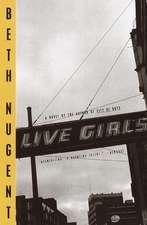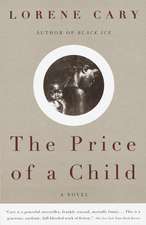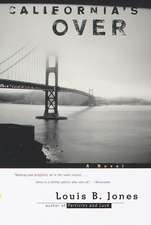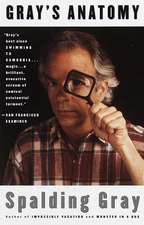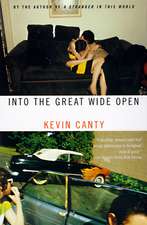Nine Below Zero: Vintage Contemporaries
Autor Kevin Cantyen Limba Engleză Paperback – 31 aug 2000
Marvin Deernose, a Native American carpenter and recovering alcoholic, has just returned to his Montana hometown with hopes of finding a new start. Early one snowy morning, Marvin notices an overturned Cadillac down an embankment. After rescuing the elderly Senator Henry Neihart, who has just suffered a stroke, Marvin is invited to the Senator's estate where he is immediately drawn to Justine Gallego, the Senator's wayward, unhappily married granddaughter. As these tarnished souls recognize their profound, shared attraction, they dive headlong into a dangerous and intense affair that forever alters the course of their lives.
Din seria Vintage Contemporaries
-
 Preț: 109.95 lei
Preț: 109.95 lei -
 Preț: 101.80 lei
Preț: 101.80 lei -
 Preț: 96.52 lei
Preț: 96.52 lei -
 Preț: 107.46 lei
Preț: 107.46 lei -
 Preț: 91.77 lei
Preț: 91.77 lei -
 Preț: 100.35 lei
Preț: 100.35 lei -
 Preț: 111.51 lei
Preț: 111.51 lei -
 Preț: 96.11 lei
Preț: 96.11 lei -
 Preț: 96.93 lei
Preț: 96.93 lei -
 Preț: 97.34 lei
Preț: 97.34 lei -
 Preț: 111.92 lei
Preț: 111.92 lei -
 Preț: 117.87 lei
Preț: 117.87 lei -
 Preț: 95.92 lei
Preț: 95.92 lei -
 Preț: 113.56 lei
Preț: 113.56 lei -
 Preț: 101.88 lei
Preț: 101.88 lei -
 Preț: 108.09 lei
Preț: 108.09 lei -
 Preț: 115.42 lei
Preț: 115.42 lei -
 Preț: 106.04 lei
Preț: 106.04 lei -
 Preț: 99.75 lei
Preț: 99.75 lei -
 Preț: 90.64 lei
Preț: 90.64 lei -
 Preț: 87.84 lei
Preț: 87.84 lei -
 Preț: 99.60 lei
Preț: 99.60 lei -
 Preț: 105.41 lei
Preț: 105.41 lei -
 Preț: 99.30 lei
Preț: 99.30 lei -
 Preț: 120.26 lei
Preț: 120.26 lei -
 Preț: 103.74 lei
Preț: 103.74 lei -
 Preț: 100.98 lei
Preț: 100.98 lei -
 Preț: 100.76 lei
Preț: 100.76 lei -
 Preț: 89.09 lei
Preț: 89.09 lei -
 Preț: 115.94 lei
Preț: 115.94 lei -
 Preț: 101.34 lei
Preț: 101.34 lei -
 Preț: 125.13 lei
Preț: 125.13 lei -
 Preț: 89.50 lei
Preț: 89.50 lei -
 Preț: 132.88 lei
Preț: 132.88 lei -
 Preț: 93.85 lei
Preț: 93.85 lei -
 Preț: 89.91 lei
Preț: 89.91 lei -
 Preț: 106.45 lei
Preț: 106.45 lei -
 Preț: 119.87 lei
Preț: 119.87 lei -
 Preț: 107.92 lei
Preț: 107.92 lei -
 Preț: 77.02 lei
Preț: 77.02 lei -
 Preț: 125.21 lei
Preț: 125.21 lei -
 Preț: 105.82 lei
Preț: 105.82 lei -
 Preț: 112.11 lei
Preț: 112.11 lei -
 Preț: 83.94 lei
Preț: 83.94 lei -
 Preț: 96.93 lei
Preț: 96.93 lei -
 Preț: 97.15 lei
Preț: 97.15 lei -
 Preț: 88.62 lei
Preț: 88.62 lei -
 Preț: 111.76 lei
Preț: 111.76 lei -
 Preț: 129.78 lei
Preț: 129.78 lei -
 Preț: 100.57 lei
Preț: 100.57 lei
Preț: 105.54 lei
Nou
Puncte Express: 158
Preț estimativ în valută:
20.20€ • 21.95$ • 16.98£
20.20€ • 21.95$ • 16.98£
Carte disponibilă
Livrare economică 31 martie-14 aprilie
Preluare comenzi: 021 569.72.76
Specificații
ISBN-13: 9780375707995
ISBN-10: 0375707999
Pagini: 384
Dimensiuni: 132 x 196 x 18 mm
Greutate: 0.32 kg
Editura: Vintage Publishing
Seria Vintage Contemporaries
ISBN-10: 0375707999
Pagini: 384
Dimensiuni: 132 x 196 x 18 mm
Greutate: 0.32 kg
Editura: Vintage Publishing
Seria Vintage Contemporaries
Notă biografică
Kevin Canty lives in Montana.
Extras
He bent to kiss her and found last night's bar in her hair: cigarette smoke, stale beer and pine disinfectant. Lie down with bartenders, he thought, wake up with angels. A sense of fairness. He summoned his courage to kiss her neck. She chased rabbits in her sleep, stirring and mumbling.
Marvin Deernose slipped out of the bedroom in stocking feet and laced up his boots in the kitchen. The philosophical Indian: he liked this hour before daylight, when he could stand outside himself, watching. An inheritance from his father, who never slept past six-thirty in his life. Marvin longed for coffee but Carla was a coffee artist, whole beans and the grinder and Herr Coffee, the German machine. No way to fire it up without waking her. He gave up, rested in her kitchen chair for a moment, enjoying the quiet, the heaviness of his body and the blue edge around every shape. The philosophical Indian finds something to admire even in the depths of a hangover. Nothing is lost on him. Empty beer cans stood along the counter like witnesses. Guilty, they declared, guilty, guilty, guilty.
Quarter to six, half an hour before daylight.
A memory: Marvin and his father sitting around the kitchen table while the rest of the house slept, his father listening to the radio, the cow and pig news out of Billings.
Cold wind pressed against the windows, a thousand miles of empty sky. It was only November but winter already, with months to come. Marvin hunched down into his good wool coat and stayed a minute longer in the warmth of her house. A longing for marriage, normality. He rubbed his face into his hands and felt the damage that had not been slept away. A moment's glimpse of the soul inside his chest, the pearly whiteness shining through the black of his sins. Like an egg. Curl up inside it. He thought of Carla sleeping, foul naked comfort between the sheets, cursing in her dreams. No, you fuck you, she told him, sound asleep. An empty pack of Marlboro lights lay crumpled on the table. Marvin saw it, felt his head spin slightly, one degree off, and then it was time to go. Temple of his body. The gates of sleep were closed against him. The day, begun, would not go backward.
Outside was zero, plus or minus. The small hairs inside his nose stiffened and froze within ten feet of her door. Petrified dog turds lay in the snow, in little caves of their own making, the action of the sun being stronger upon the darkly colored turds than upon the lightly colored snow. So saith the scientific Indian. The time and place for science, and not for natural comfort or ease, living simply in the world. In the darkness and cold was the need for technology. When his pickup started on the first crank, Marvin reached his bare hand out and petted the cold steel of the dashboard, good dog Ford. The cold was like a gigantic weight, pressing the houses down against the earth. The human skin, like the skin of an orange.
The sun was just under the horizon, rising up out of the plains. The sky was hammered lead. Marvin could see fine but when he turned the headlights on, he was surprised at how bright they were.
King of the world: the only one awake. He drove the sleeping streets downtown, past the Sportsman's Lounge, scene of the crime. The one traffic light was blowing around on its cable, stop, go, I forget. Nine below zero by the Rosebud Farmers and Merchant clock, nowhere close. If the bankers wanted Marvin to trust them, why did they set their clock to lie? A kind of flattery. Colder in the winter, hotter in the summer, the pioneer spirit lives on in our hearts. Indian uprising: try extra value checking. The American suckers were asleep with their wives in their snug little houses, the chainlink yards holding in each private patch of blackening snow. Dogs barked at his pickup. Little box houses with too many things in the yard: boats, trucks, Corvettes, doghouses, decorative concrete, motorcycles, birdbaths, wishing wells, Studebakers, canoes, firewood, anonymous shapes under blue plastic tarps, a plaster Mexican, a painted-plywood rear view of a fat woman planting flowers, snowmobiles, Montegos, Satellite Sebrings, barbecue grills, deer hides, smokers made from dead refrigerators, all covered with a rotting patchwork of snow, all but the satellite dish, swept clean to improve reception.
It felt like breaking free when he passed the last Circle K, the final mobile home lot: trailers lined up along the highway like tin pigs and the American flags and the enormous sign lit up against the morning sky: instant quality living. Out onto the plains with the sun just balanced on the line of the horizon. A break in the clouds along the edge of the world. The first light shined up against the hills and valleys of the clouds, another country, upside down, undiscovered. Lighting out for the cloud territories. Marvin laughed at his own joke, feeling a lightness anyway, the road curving around and then up into the sky in his Ford F-150.
The angel was separating out from the animal.
Marvin the body (the husk, he thinks, the shell, the left-behind) was starting to disintegrate. The morning sunlight was everything he was not: pure, clean, lovely. He remembered Carla pouring bar whiskey out of the gun. The memory made his teeth hurt in the morning light. He kept his mouth shut so the light wouldn't get to his teeth. The empty pack of cigarettes on the kitchen table was not the one he had started out with but a second pack he had bought in the bar. Carla smoked a couple of them but still: why? Death by cigarette, maybe, but that didn't feel like the point either. He held his hand in midair in front of his face, to see if it was trembling, and it was. Marvin was feeling sorry for himself, the expansive alcoholic self-pity, when he saw:
A white horse was bleeding to death in the snow, coming down the hill into the Silver Creek valley. Red snow and the front legs slashing and what? Something was wrong. He couldn't catch up.
Marvin hit the brakes and the Ford went sideways, black ice magic. First he did a straight spin, a 360, wound up somehow going forward again at about forty miles an hour with his brakes locked up tight. He tried to get his brain to let up on the pedal but the brain was paralyzed, too much confusion, too fast. In his eyes he saw the horse, a white horse, brilliant red bleeding, blood coming out of its nose and its asshole, eyes still open, looking at him, intelligent: Why are you doing this to me? Marvin knew it was his fault.
Marvin Deernose slipped out of the bedroom in stocking feet and laced up his boots in the kitchen. The philosophical Indian: he liked this hour before daylight, when he could stand outside himself, watching. An inheritance from his father, who never slept past six-thirty in his life. Marvin longed for coffee but Carla was a coffee artist, whole beans and the grinder and Herr Coffee, the German machine. No way to fire it up without waking her. He gave up, rested in her kitchen chair for a moment, enjoying the quiet, the heaviness of his body and the blue edge around every shape. The philosophical Indian finds something to admire even in the depths of a hangover. Nothing is lost on him. Empty beer cans stood along the counter like witnesses. Guilty, they declared, guilty, guilty, guilty.
Quarter to six, half an hour before daylight.
A memory: Marvin and his father sitting around the kitchen table while the rest of the house slept, his father listening to the radio, the cow and pig news out of Billings.
Cold wind pressed against the windows, a thousand miles of empty sky. It was only November but winter already, with months to come. Marvin hunched down into his good wool coat and stayed a minute longer in the warmth of her house. A longing for marriage, normality. He rubbed his face into his hands and felt the damage that had not been slept away. A moment's glimpse of the soul inside his chest, the pearly whiteness shining through the black of his sins. Like an egg. Curl up inside it. He thought of Carla sleeping, foul naked comfort between the sheets, cursing in her dreams. No, you fuck you, she told him, sound asleep. An empty pack of Marlboro lights lay crumpled on the table. Marvin saw it, felt his head spin slightly, one degree off, and then it was time to go. Temple of his body. The gates of sleep were closed against him. The day, begun, would not go backward.
Outside was zero, plus or minus. The small hairs inside his nose stiffened and froze within ten feet of her door. Petrified dog turds lay in the snow, in little caves of their own making, the action of the sun being stronger upon the darkly colored turds than upon the lightly colored snow. So saith the scientific Indian. The time and place for science, and not for natural comfort or ease, living simply in the world. In the darkness and cold was the need for technology. When his pickup started on the first crank, Marvin reached his bare hand out and petted the cold steel of the dashboard, good dog Ford. The cold was like a gigantic weight, pressing the houses down against the earth. The human skin, like the skin of an orange.
The sun was just under the horizon, rising up out of the plains. The sky was hammered lead. Marvin could see fine but when he turned the headlights on, he was surprised at how bright they were.
King of the world: the only one awake. He drove the sleeping streets downtown, past the Sportsman's Lounge, scene of the crime. The one traffic light was blowing around on its cable, stop, go, I forget. Nine below zero by the Rosebud Farmers and Merchant clock, nowhere close. If the bankers wanted Marvin to trust them, why did they set their clock to lie? A kind of flattery. Colder in the winter, hotter in the summer, the pioneer spirit lives on in our hearts. Indian uprising: try extra value checking. The American suckers were asleep with their wives in their snug little houses, the chainlink yards holding in each private patch of blackening snow. Dogs barked at his pickup. Little box houses with too many things in the yard: boats, trucks, Corvettes, doghouses, decorative concrete, motorcycles, birdbaths, wishing wells, Studebakers, canoes, firewood, anonymous shapes under blue plastic tarps, a plaster Mexican, a painted-plywood rear view of a fat woman planting flowers, snowmobiles, Montegos, Satellite Sebrings, barbecue grills, deer hides, smokers made from dead refrigerators, all covered with a rotting patchwork of snow, all but the satellite dish, swept clean to improve reception.
It felt like breaking free when he passed the last Circle K, the final mobile home lot: trailers lined up along the highway like tin pigs and the American flags and the enormous sign lit up against the morning sky: instant quality living. Out onto the plains with the sun just balanced on the line of the horizon. A break in the clouds along the edge of the world. The first light shined up against the hills and valleys of the clouds, another country, upside down, undiscovered. Lighting out for the cloud territories. Marvin laughed at his own joke, feeling a lightness anyway, the road curving around and then up into the sky in his Ford F-150.
The angel was separating out from the animal.
Marvin the body (the husk, he thinks, the shell, the left-behind) was starting to disintegrate. The morning sunlight was everything he was not: pure, clean, lovely. He remembered Carla pouring bar whiskey out of the gun. The memory made his teeth hurt in the morning light. He kept his mouth shut so the light wouldn't get to his teeth. The empty pack of cigarettes on the kitchen table was not the one he had started out with but a second pack he had bought in the bar. Carla smoked a couple of them but still: why? Death by cigarette, maybe, but that didn't feel like the point either. He held his hand in midair in front of his face, to see if it was trembling, and it was. Marvin was feeling sorry for himself, the expansive alcoholic self-pity, when he saw:
A white horse was bleeding to death in the snow, coming down the hill into the Silver Creek valley. Red snow and the front legs slashing and what? Something was wrong. He couldn't catch up.
Marvin hit the brakes and the Ford went sideways, black ice magic. First he did a straight spin, a 360, wound up somehow going forward again at about forty miles an hour with his brakes locked up tight. He tried to get his brain to let up on the pedal but the brain was paralyzed, too much confusion, too fast. In his eyes he saw the horse, a white horse, brilliant red bleeding, blood coming out of its nose and its asshole, eyes still open, looking at him, intelligent: Why are you doing this to me? Marvin knew it was his fault.
Recenzii
"Given Canty's fondness for the American loner and the lonely landscape of the American West, it's no wonder that his latest novel is set in rural Montana in winter, or that his two principal characters--and ex-Senator's granddaughter and a Native American carpenter--share nothing but a sense of isolation in their respective worlds. Tragedy unites them, and, caught in the narrow judgment of a small town, they are surprised to discover that sometimes solace requires someone else. --The New Yorker
"Canty's forte is to examine human relationships with the precision of a Sue Miller or Louise Erdrich within the context of a fast-moving narrative. Once he's got you in his thrall, you're as helpless as his lovers in the hands of fate." --Newsday
"A brilliant second novel that confirms the arrival of a major new talent in fiction." --Minneapolis Star-Tribune
"Canty's forte is to examine human relationships with the precision of a Sue Miller or Louise Erdrich within the context of a fast-moving narrative. Once he's got you in his thrall, you're as helpless as his lovers in the hands of fate." --Newsday
"A brilliant second novel that confirms the arrival of a major new talent in fiction." --Minneapolis Star-Tribune
Descriere
Capturing the wide expanses of the American West with his characteristic acute gaze and cool, spare prose, Canty has produced a penetrating exploration of reckless love and loss. "Smart, gritty, unsentimental. . . . Finely tuned to the precariousness and treachery of human need".--"The New York Times".






